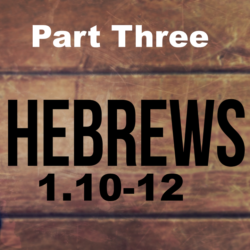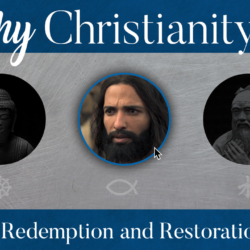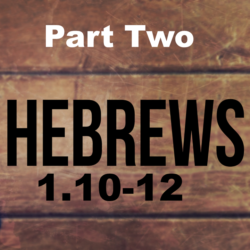 Last time, Jerry Wierwille explained the concept of covenantal nomism–the idea that rather than seeking to earn their salvation through perfect obedience, Jews at the time of Christ looked at the Law as a covenant God graciously entered into with his people. They enter that covenant by birth and then need to remain faithful to it through obedience to Torah. This time he shows how this new perspective on Paul affects how we read his epistles. Looking at the first few chapters of Galatians, Wierwille deciphers what Paul was saying about the Law for Christians both Jewish and Gentile.
Last time, Jerry Wierwille explained the concept of covenantal nomism–the idea that rather than seeking to earn their salvation through perfect obedience, Jews at the time of Christ looked at the Law as a covenant God graciously entered into with his people. They enter that covenant by birth and then need to remain faithful to it through obedience to Torah. This time he shows how this new perspective on Paul affects how we read his epistles. Looking at the first few chapters of Galatians, Wierwille deciphers what Paul was saying about the Law for Christians both Jewish and Gentile.
—— Links ——
- Listen to Wierwille’s previous interviews here
- Check out these sermons and articles on Wierwille’s website (JerryWierwille.com)
- Intro music: Jazzy Frenchy by bensound.com. Licensed under Creative Commons: By Attribution 3.0 License.







Got to listen today. I feel after listening and hearing the comments by another listener from the last podcast which you read aloud that person sort of hit the nail on the head believing that Jerry would have a “typical teaching” on Galatians on Paul. I was expecting a bit more I believe that would confront my current understanding… so maybe that’s my fault because I know you tried to get through much of the topic as quickly as possible with an hour podcast even though we all know there’s a lot to Galatians. I would be interested in hearing someone like Matthew Janzen and/or Daniel Calcagno speak with Jerry about the book of Galatians. I know the same topic can’t drone on forever but that would be a good discussion or formal debate subject in the future if you return to the topic again.
A simple problem(unless I misunderstood the analogy) with the belief of the Torah as a schoolmaster being likened to a driving permit contrasted with a driver’s license would be the fact that once out from beneath a permit, that means as you guys even said you’re considered responsible to handle driving on your own. That would obviously mean you’re not needed to be told what to do and how to drive by a teacher/parent every time you’re out—it would mean you’re obeying the normal laws, not free to break them cause you’re on your own. Taking that over to the Torah doesn’t seem to be stretching but it would mean you’re obeying it now inwardly by the spirit and heart rather than just outward rules–which was the purpose of the New Covenant. Jeremiah 31:31-34 pretty much explains that I believe.
I also disagree with the understanding Sean brought up of Romans 14. You’ve probably already heard it before Sean from others, but I think the text more clearly supports the view in here is about fasting(eating/not eating) and/or being a vegetarian and which day one chooses to do such fasts. It doesn’t say anything about “resting/Sabbath” in this text. There’s no law about which day one can fast nor a law that condemns someone for eating only vegetables. There were supposedly certain days which the different sects of Jews fasted, which led to this debate. I believe that was Paul’s concern.
Unless you can point me to a direct podcast/audio you’ve already recorded on your views Sean with regards to the Torah I’d be interested in hearing how you view it in the future more clearly laid out. Jesus taught many things within the Torah and said disciples would be like him which you don’t seem to advocate so it’s unclear where you stand when you promote the commands of Jesus in Matthew 5-7 and don’t seem to promote others. Also, how do you view the Sh’ma then with regards to “not keeping the Torah” when it’s clearly part of the Torah? In fact it’s the most important law as we both know according to Jesus(Mark 12:29).
I know this wasn’t part of the discussion but it’s relevant too–how does Jerry view commands from 1st John with regards to actually “knowing Jesus”? 1st John 2:3-6 says Christians ought to walk *just* *as* Jesus walked… I don’t know how else to interpret that other than the commands of the Torah at this point. Christians weren’t to be known just by faith, but also by obedience in that faith as far as I read. Obedience to what commands then exactly? Because NT commands by Jesus include obeying the applicable Torah(Matthew 23:3) taught by the religious leaders at that time who taught Moses from what I read. It seems there were always groups on each side leaning too far to one side or the other(all faith, no obedience or all obedience but not in faith).
Told you I’m still very much trying to figure this out! : )
Also, Sean Holbrook, I would like your email to discuss some things. Here is an audio link to an older series on Galatians by Daniel Lancaster. It’s slowly being uploaded to this site. It’s something that I would, and I know Daniel Calcagno would as well, recommend.
Hello Brian,
I saw your reply below so I added some comments here. Yeah I also have had the same thought about the claim of others double-version of Paul when he’s around Gentiles vs. Jews. I find it clearly hypocritical to say one follows the Torah around some, and then not around others. I think anyone could pick up on that and call him out–and what in the world would Paul do if there was a group of Jews/Gentiles together? Does he obey Torah or not? Why wouldn’t he just be up front about non-Torah advocacy? Like I quoted in the last one, why would Paul say “Imitate me as I imitate Christ” if he didn’t mean to walk as Jesus walked? And that’s right after the usual context used to support the double-Paul Jews vs. Gentiles verses.
I think one of the major problems in Jesus’ day and the religious leaders were additions TO the Torah and other traditions which many Jews were entrenched into believing. So when it was brought up in the audio that “Jews cannot fellowship with Gentiles,” this was traditional “law”–not Torah despite Peter’s claim in Acts 10 with regard to visiting Cornelius. There is no law in the Torah that states this to my knowledge. If there is I’m open to hearing more. So God was constantly fighting the traditions of the religious leaders(as was Jesus) to bring them back to unadulterated Torah keeping from the heart.
My email is LTAWESOME16@hotmail.com. Feel free to send me some stuff and I can try to add to it. I can’t guarantee I’ll be really involved though. I try to make it a point to check up on Sean Finnegan’s podcast and stay involved in the discussion but I’m working tons of OT and fixing up a lot of stuff around my house this summer.
Thanks Sean and Jerry on the presentation around a new perspective on Galatians. This has been a wonderful shift for me in understanding and appreciation of the scriptures. Much of the tension that I thought existed between the Law and the new covenant was really only, in part, because of the robust language Paul used in Galatians and elsewhere, and of my preconceived ideas coloring my understanding. I suspect the average 20th century Australian does not think, discuss or understand matters of the Law exactly like a 1st century Jewish Christian person, without a little help!!!!!! I now see the relationship between the Law and the new covenant as so much more sublime. How could it be anything else as the Author of both is none other than the Father. Jerry has now sentenced me to re-read the Christian scriptures particularly Romans, Hebrews and Galatians with my Jerry goggles on, really how beautiful are the feet of those who bring good news of good things, Romans 10:15, This podcast was “good things”, praise to the Father, thank you guys.
Well, Jerry certainly presented the New Perspective on Paul ( I prefer Scot McKnight’s label: The New Perspective on Judaism) well. Also, I’m glad that this interview has been a blessing to some (see John above).
At 40:50 in, Jerry states, “While he [Paul] still observed law in certain contexts in other places he didn’t.” And then again at 43:50, “and he also mentions in 1 Cor 9 that he was Torah observant at times when he was among the Jews in his effort to preach the gospel to them, and for them to see the significance of the Christ event. But then when he was not with Jews he was not Torah observant. So he catered to the circumstance of which would make him the most effective minister, evangelist and apostle for the Lord possible.” While this interpretation is quite conventional, it has been and continues to be called into question. It is illogical. Was Paul a Chameleon then, changing colors as he wished? Were first century Jews idiots? So Paul would go to a Synagogue loaded with Jews and be “the most effective minister, evangelist and apostle for the Lord possible” by being Torah observant, and then go visit a gentile home next door and discard his Torah observance, and the Jews at the Synagogue he was just at didn’t notice at all? This is a duplicitous Paul and it does not line up with 2 Cor 4:2 “…not walking in craftiness/We don’t use tricks/We do not use deception.” Nor does this interpretation line up with Luke’s historical portrait of the Torah observant Paul. Remember, Acts 21:21 is speaking about rumors, not things Paul actually did. Luke’s Paul says “I have committed no offense either against the Law of the Jews or against the temple or against Caesar.” (Acts 25:8).
There are better ways to understand Galatians, Romans, 1 Cor and the whole corpus of the Pauline writings, and Hebrews! But it’s superfluous to write them out here. Besides, I don’t have a PhD, or any graduate degrees in Pauline studies. I just read books, so what I have to contribute doesn’t really matter, it can just be jettisoned because the majority of scholars don’t hold this position, despite the fact that N.T. Wright comments in his Magnum Opus, Paul and the Faithfulness of God, on page 1445,”This so-called ‘post-supersessionist’ position, however, is itself well on the way to becoming a new ‘consensus’.”
Perhaps we can work together to set up a follow up interview to this with Mark Nanos later on in the year. He has a new book of collected essays on Galatians coming out this September. You can get the book and read an essay or two and then maybe have him discuss them.
Hey Sean,
Got a comment for you to ponder. You answered some of my concerns in the 1st Calvinism aftershow but I didn’t want to leave my comment replies on there since it would look off-topic to the main subject.
If I remember correctly you mentioned that you agreed that you’re not aware of any “law/Torah” that forbids a Jew from being in company with a Gentile(like going into their home, eating with them) and you were surprised that Jerry kind of just assumed that and moved on. Yet in response to myself and Brian’s concerns about Paul’s duplicity in the company of Jews/Gentiles together your gave Paul’s dispute with Peter told about in Galatians 2 to show that Paul was against the Torah advocacy in their company. Do you not believe that these two subjects/texts are directly connected?
You agree that it was not a law for Jews to not be around Gentiles, and then right after that show an example of that exact subject of traditional law in Galatians 2. I believe it’s possible this tradition of separating off from Gentiles might have been an oral law and that when Peter saw the Jews of the circumcision party he fell back into tradition—not Torah keeping. That was what Paul was rebuking Peter for just as Jesus was many a time rebuking the religious leaders for adding to the Torah or even at times contradicting God’s Torah with their law interpretations. Peter could have turned around and rebuked Paul for circumcising Timothy, or keeping the feasts, taking a Nazirite vow etc… if that’s what Paul was concerned about.